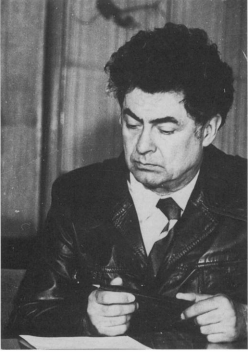Written by Salaam Sbini, a fourth year history student participating in the IMLS, “Strategic Stewardship for Sustaining the Archives of the Museum of Vertebrate Zoology” project.
Every so often I go through a correspondence file that goes beyond the United States’ borders and territories. Dr. Vladimir Evgenevich Sokolov’s file was a reminder of America’s relations past its domestic realm, its relations with the formerly named USSR, and its pursuit of education. The first of the correspondence letters was a detailed itinerary report for Dr. Sokolov’s visit to the United States in 1965, including a long stay at the University of California Berkeley, Museum of Vertebrate Zoology (MVZ). This itinerary was put together and sent by the “Committee on Friendly Relations Among Foreign Students,” an organization that facilitated international students, scholars, and professors visits and stays at universities and educational institutions – now known as the International Student Service.

Vladimir Evgenevich Sokolov: 1928-1998 American Society of Mammalogists http://www.jstor.org/stable/1383187
Dr. Sokolov was a pioneer in the environmental movement in Russia, and one of Russia’s first global sustainability advocates. Taking after his father, a zoology professor, Dr. Sokolov was a zoologist and renown leader in mammalogy. His area of expertise was on the form and functions of mammalian skin. His published works from Moscow State University and his general dissertation work from the Moscow Fur Institute in 1953 became internationally acclaimed. An ardent internationalist, he organized grouped zoological excursions with different foreign scientific organizations in different parts of the world. In 1965, Dr. Sokolov began his first organized visits to the United States, touring Washington D.C., Yale, New York, Minneapolis, Missoula, to the West Coast, Seattle, San Francisco, Utah, Los Angeles. His arrangements orchestrated through “Inter-University Committee on Travel Grant” on behalf of UC Berkeley and other universities such as UCLA, Harvard, and Yale with the presence of a representative of the Soviet Ministry of Higher Education.
The letters, including details of travel reports, government regulation citations of Soviet scholarly visits, and caution of visa disapproval that are requested by the Soviet Union were a reflection of the turbulent times between the USSR and the United States. The year of Dr. Sokolov’s visit was when President Lyndon B. Johnson ordered american troops into Vietnam. The year before was the fall of Khrushchev, two years before that was the infamous Cuban Missile Crisis in 1962. Yet with the political climate and sociopolitical occurrences that took shape in 1965, there was a push to bring Dr. Sokolov to the MVZ and have him share his scholarly expertise to students across the country. This was a moment of transcending propaganda and politics, in exchange of intellectual discussion and discoveries. May we all push toward human progress and scientific discovery.
References:
Shishkin, Vladimir S., and Robert S. Hoffmann. “Vladimir Evgenevich Sokolov: 1928-1998.” Journal of Mammalogy 80, no. 4 (1999): 1361-364. http://www.jstor.org/stable/1383187.
https://2001-2009.state.gov/r/pa/ho/pubs/fs/85895.htm#troops_to_vietnam
